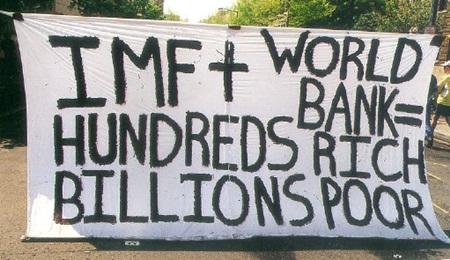Ireland and the IMF - out of the frying pan...

There's a story taking hold already about the arrival of the IMF on Irish soil. Yes, it is a shameful moment in our history to have gotten ourselves into this position. Yes, the Government which brought us to this pass will get a deserved roasting at the next election. But now that we're reached this point, the worst is over. We've hit rock-bottom and the only way is up.
Although faith in the Government's economic competence has finally shattered, it is being replaced with an equally delusional faith in the IMF and the European Central Bank. These guys know what they're doing, we're told. They know one end of a balance sheet from another. The IMF experts will take over from this shower of chancers who've made a mess of things and get the economy back on an even keel. They'll just be making us do all the things we should have been doing already.
If only ...
Unfortunately, there's no reason to feel so confident about the road ahead. For starters, let's remind ourselves why the "bailout" is happening, and what it actually means. When the IMF pumps money into a struggling economy, they're not trying to help its people cope with hard times. Their goal is to protect foreign banks who would take a hit if Ireland defaulted on its loans. This has been the pattern ever since the first big bailout organised by the IMF when Mexico was about to default in the 1980s. The IMF/EU money will be transferred to the Irish state, passed immediately on to the Irish banks and back out again to their foreign creditors. The Irish people can then pick up the tab at their leisure – with a hefty interest rate on the principal.
That's not where the IMF's role comes to an end. Ever since the Mexican debt crisis, they've used financial crises to impose a set of rigid, ultra-conservative economic policies on the governments that need their help. In theory, they believe these policies will bring economic growth and prosperity. But the recipe has failed so many times, in so many different parts of the world, it is hard to accept that the bright sparks of the IMF are simply deluded.
That leads us to the second part of the equation. While the IMF policy strait-jacket may not deliver the goods when it comes to growth and employment, there's always money to be made stripping a country for spare parts. "Privatise, privatise, and privatise again" is one of the IMF mantras, and that usually means selling off the assets of the State at fire-sale prices to foreign companies. The Irish economy is already suffering from the long-term effects of the Eircom privatisation fiasco: if the IMF follows its usual pattern, expect similar tales of woe in the coming years.
The IMF team who arrived in Dublin have already shown us the colour of their money. Their first demand was that Ireland should cut its dole and minimum wage. Classic right-wing economic dogma: because the free market is a perfect system, unemployment can only exist if the state is interfering with the free play of market forces. Don't imagine for a moment that the IMF squad spent hours pondering all the ins and outs before arriving at that conclusion. If the minimum wage was five euro an hour, they would have told us to lower it. If it was one euro an hour, they would have told us to lower it. If the minimum wage had already been abolished last year, they would have told us to abolish it again, just to be on the safe side.
Barely a week after the IMF arrived in town, we can already predict what the effect of its intervention will be: to encourage whatever government is in power to follow the same failed deflationary policies that have dragged the Irish economy into its current mire. As long as the bondholders are taken care of, they don't mind if Ireland spends the next few years in a deep recession. The only hope for Ireland lies in resistance to everything the IMF stands for.
